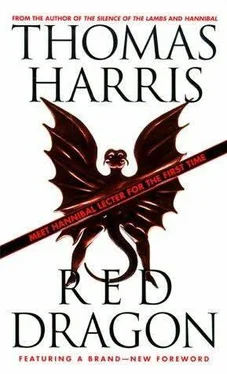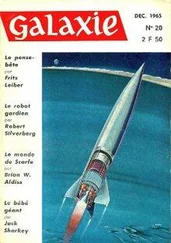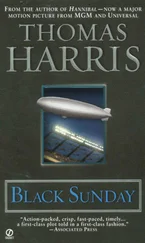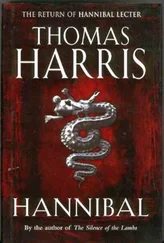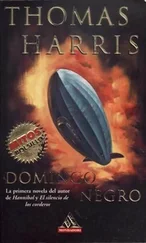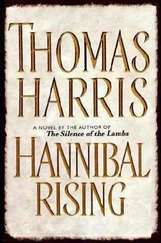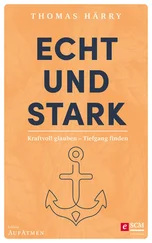Film beside his projector. Two subjects. Other reels are piled in the wastebasket for burning. Two left, chosen from the dozens of home movies he has copied at the plant and brought home to audition.
Comfortable in his reclining chair with a tray of cheese and fruit beside him, Dolarhyde settles in to watch.
The first film is a picnic from the Fourth of July weekend. A handsome family; three children, the father bull-necked, dipping into the pickle jar with his thick fingers. And the mother.
The best view of her is in the softball game with the neighbors' children. Only about fifteen seconds of her; she takes a lead off second base, faces the pitcher and the plate, feet apart ready to dash either way, her breasts swaying beneath her pullover as she leans forward from the waist. An annoying interruption as a child swings a bat. The woman again, walking back to tag up. She puts one foot on the boat cushion they use for a base and stands hip-shot, the thigh muscle tightening in her locked leg.
Over and over Dolarhyde watches the frames of the woman. Foot on the base, pelvis tilts, thigh muscle tightens under the cutoff jeans.
He freezes the last frame. The woman and her children. They are dirty and tired. They hug, and a dog wags among their legs.
A terrific crash of thunder clinks the cut crystal in Grandmother's tall cabinet. Dolarbyde reaches for a pear.
The second film is in several segments. The title, The New House , is spelled out in pennies on a shirt cardboard above a broken piggy bank. It opens with Father pulling up the "For Sale" sign in the yard. He holds it up and faces the camera with an embarrassed grin. His pockets are turned out.
An unsteady long shot of Mother and three children on the front steps. It is a handsome house. A cut to the swimming pool. A child, sleek-headed and small, pads around to the diving board, leaving wet footprints on the tile. Heads bob in the water. A small dog paddles toward a daughter, his ears back, chin high, and the whites of his eyes showing.
Mother in the water holds to the ladder and looks up at the camera. Her curly black hair has the gloss of pelt, her bosom swelling shining wet above her suit, her legs wavy below the surface, scissoring.
Night. A badly exposed shot across the pool to the lighted hous; the lights reflected in the water.
Indoors and family fun. Boxes everywhere, and packing materials. An old trunk, not yet stored in the attic.
A small daughter is trying on Grandmother's clothes. She has on a big garden-party hat. Father is on the sofa. He looks a little drunk. Now Father must have the camera. It is not quite level. Mother is at the mirror in the hat.
The children jostle around her, the boys laughing and plucking at the old finery. The girl watches her mother coolly, appraising herself in time to come.
A close-up. Mother turns and strikes a pose for the camera with an arch smile, her hand at the back of her neck. She is quite lovely. There is a cameo at her throat.
Dolarhyde freezes the frame. He backs up the film. Again and again she turns from the mirror and smiles.
Absently Dolarhyde picks up the film of the softball game and drops it in the wastebasket.
He takes the reel from the projector and looks at the Gateway label on the box: Bob Sherman, Star Route 7, Box 603, Tulsa, Okla.
An easy drive, too.
Dolarhyde holds the film in his palm and covers it with his other hand as though it were a small living thing that might struggle to escape. It seems to jump against his palm like a cricket.
He remembers the jerkiness, the haste at the Leeds house when the lights came on. He had to deal with Mr. Leeds before turning on his movie lights.
This time he wants a smoother progression. It would be wonderful to crawl in between the sleepers with the camera going and snuggle up a little while. Then he could strike in the dark and sit up between them happily getting wet.
He can do that with infrared film, and he knows where to get some.
The projector is still on. Dolarhyde sits holding the film between his hands while on the bright blank screen other images move for him to the long sigh of the wind.
There is no sense of vengeance in him, only Love and thoughts of the Glory to come; hearts becoming faint and fast, like footsteps fleeing into silence.
Him rampant. Him rampant, filled with Love, the Shermans opening to him.
The past does not occur to him at all; only the Glory to come. He does not think of his mother's house. In fact, his conscious memones of that time are remarkably few and indistinct.
Sometime in his twenties Dolarhyde's memories of his mother's house sank out of sight, leaving a slick on the surface of his mind.
He knew that he had lived there only a month. He did not recall that he was sent away at the age of nine for hanging Victoria 's cat.
One of the few images he retained was the house itself, lighted, viewed from the street in winter twilight as he passed it going from Potter Gerard Elementary School to the house where he was boarded a mile away.
He could remember the smell of the Vogt library, like a piano just opened, when his mother received him there to give him holiday things. He did not remember the faces at the upstairs windows as he walked away, down the frozen sidewalk, the practical gifts burning hateful under his arm; hurrying home to a place inside his head that was quite different from St. Louis.
At the age of eleven his fantasy life was active and intense and when the pressure of his Love grew too great, he relieved it. He preyed on pets, carefully, with a cool eye to consequence. They were so tame that it was easy. The authorities never linked him with the sad little bloodstains soaked into the dirt floors of garages.
At forty-two he did not remember that. Nor did he ever think about the people in his mother's house – his mother, stepsisters, or stepbrother.
Sometimes he saw them in his sleep, in the brilliant fragments of a fever dream; altered and tall, faces and bodies in bright parrot colors, they poised over him in a mantis stance.
When he chose to reflect, which was seldom, he had many satisfactory memories. They were of his military service.
Caught at seventeen entering the window of a woman's house for a purpose never established, he was given the choice of enlisting in the Army or facing criminal charges. He took the Army.
After basic training he was sent to specialist school in darkroom operation and shipped to San Antonio, where he worked on medical-corps training films at Brooke Army Hospital.
Surgeons at Brooke took an interest in him and decided to improve his face.
They performed a Z-plasty on his nose, using ear cartilage to lengthen the columella, and repaired his lip with an interesting Abbé flap procedure that drew an audience of doctors to the operating theater.
The surgeons were proud of the result. Dolarhyde declined the mirror and looked out the window.
Records at the film library show Dolarhyde checked out many films, mainly on trauma, and kept them overnight.
He reenlisted in 1958 and in his second hitch he found Hong Kong. Stationed at Seoul, Korea, developing film from the tiny spotter planes the Army floated over the thirty-eighth parallel in the late 1950's, he was able to go to Hong Kong twice on leave. Hong Kong and Kowloon could satisfy any appetite in 1959.
Grandmother was released from the sanatorium in 1961 in a vague Thorazine peace. Dolarhyde asked for and received a hardship discharge two months before his scheduled separation date and went home to take care of her.
It was a curiously peaceful time for him as well. With his new job at Gateway, Dolarhyde could hire a woman to stay with Grandmother in the daytime. At night they sat in the parlor together, not speaking. The tick of the old clock and its chimes were all that broke the silence.
Читать дальше
